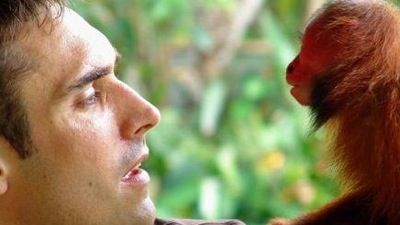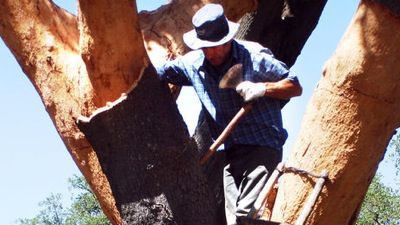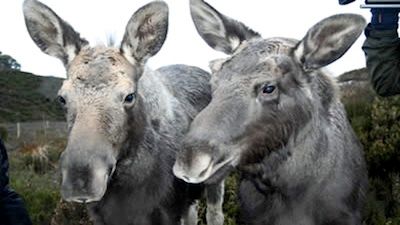The WORST episodes of Natural World
Every episode of Natural World ever, ranked from worst to best by thousands of votes from fans of the show. The worst episodes of Natural World!
Expeditions that take the viewer far away from the urban jungle to present the life of animals that live in the real jungle.
#1 - Mysteries of the Ocean Wanderers
Season 13 - Episode 1 - Aired 11/27/1994
Focusing on a pair of albatrosses during the year they produce and raise a chick, Mysteries of the Ocean Wanderers is an engaging and atmospheric insight into the wildlife of the sub-Antarctic Crozet Islands. Delving into a previously unknown area, the film follows the intriguing work of French scientist Henri Weimerskirch as he uses satellite tracking and time-depth recorders to follow the ever changing population of these remote isles.
#2 - Vampires, Devilbirds and Spirits: Tales of the Calypso Isles
Season 12 - Episode 7 - Aired 4/3/1994
A celebration of Caribbean wildlife, Vampires, Devilbirds and Spirits: Tales of the Calypso Isles takes an entertaining look at the myths and legends of Trinidad and Tobago, and many of the creatures on which they are based. Nature plays a significant role in the country’s folklore, with narration by a local person and extensive role-play, the production interweaves these intriguing tales with impressive photography of the abundant wildlife, including infra-red footage of the elusive cave-dwelling oilbirds.
#3 - Pandas of the Sleeping Dragon
Season 12 - Episode 8 - Aired 4/4/1994
Filmed in the nature reserves of the mixed bamboo forests of the Sleeping Dragon Mountains in Sichuan province, central China. Focuses on the predicament of the giant panda and on the lessser-known red panda. The giant panda's digestive system is more suited to meat eating yet, because it feeds almost exclusively on bamboo, which has a low nutritional value, the animal must feed virtually around the clock to survive. Other animals that live in the forests include parrot bills, bamboo rats, golden monkeys, tufted deer, wild dogs, golden pheasants and the takin - a distant relative of the musk ox. The giant salamander, known as the water dragon, the world's largest amphibian is also to be found in the area.
#4 - The Witness Was a Fly
Season 12 - Episode 9 - Aired 4/17/1994
Scientists demonstrate ways in which animals, insects and plants can provide clues to the detection of crimes.
#5 - Untangling the Knot
Season 12 - Episode 10 - Aired 4/24/1994
Follows Dutch, Canadian and British biologists as they chart the journeys of two groups of knots(shorebirds) from South America and South Africa.
#6 - Snowdonia: Realm of Ravens
Season 12 - Episode 11 - Aired 5/8/1994
Reveals the most complete record of raven life ever filmed, at the National Park.
#7 - Race for Life: Africa's Great Migration
Season 12 - Episode 12 - Aired 5/15/1994
Records the epic joiurney of more than a million and a half wildebeest, travelling in a 500 mile arc across the Serengeti National Park in Tanzania.
#8 - Islands in the African Sky
Season 12 - Episode 13 - Aired 5/22/1994
An atmospheric and evocative portrayal of the wildlife in East Africa's rugged mountain ranges, Islands in the African Sky was widely acclaimed for its stunning soundtrack. The second part of an African trilogy, the production explores the extraordinary adaptations and unusual appearances that have evolved to aid survival in this extreme climate. Straddling the equator, the mountains undergo vast temperature changes as scorching days give way to arctic nights. The intriguing footage is brought to life by Gunning's powerful score, the haunting sounds emphasising both the eerie beauty and intense mystique of this hostile land.
#9 - Comrades of the Kalahari
Season 12 - Episode 14 - Aired 5/29/1994
Focuses on the co-operation between the yellow mongoose and the ground squirrel that enables both species to thrive in the arid Kalahari.
#10 - Webs of Intrigue
Season 12 - Episode 6 - Aired 3/27/1994
Wildlife film capturing the Dinopis spider and Sydney funnelweb amongst others.
#11 - Badlands
Season 13 - Episode 2 - Aired 12/4/1994
Documentary on the prairie dog of the South Dakota Badlands.
#12 - Hunters of the Sea Wind
Season 13 - Episode 3 - Aired 12/11/1994
Documentary showing life under the Pacific Ocean and the predatory life of the marlin, sailfish, sea snakes, dolphins and tuna, birds and turtles.
#13 - Parrots: Look Who's Talking!
Season 13 - Episode 4 - Aired 1/15/1995
Examines the parrot in the wild and sees how its natural behaviour is modified in a domesticated environment.
#15 - Ytene: England's Ancient Forest
Season 13 - Episode 6 - Aired 1/29/1995
Documentary, filmed over a two year period, exploring the wildlife found in the New Forest in southern England, which the Saxons called Ytene. The woodland, bogs and heaths of the area are home to wild ponies, fallow deer, badgers, foxes, wildfowl, and insects. Seasonal changes are shown, and some elusive species, such as firecrests, hawfinches, woodlarks and tadpole shrimps are pictured. The programme is interwoven with a history of land use in the area from mediaeval times.
#16 - Gentle Jaws of the Serengeti
Season 13 - Episode 7 - Aired 2/12/1995
Focuses on a clan of spotted hyenas.
#17 - Monkey in the Mirror
Season 13 - Episode 8 - Aired 2/19/1995
Observes some of the behaviour of the Bonobos, pygmy chimpanzees that inhabit a remote area of rainforest in Zaire. The species is considered to be man's closest living relative.
#18 - Ocean Drifters
Season 13 - Episode 9 - Aired 2/26/1995
Examines the weird planktonic animals that drift in the current of the Gulf Stream as it passes Florida and enters the Atlantic. Follows a baby loggerhead turtle which hatches on a Florida beach and heads out to the Atlantic.
#19 - Island of the Ghost Bear
Season 12 - Episode 5 - Aired 3/20/1994
Reveals the life of the snow-white black bears that inhabit a remote island off the coast of British Columbia in Canada. The whiteness of the bear is believed to be caused by a double recessive gene.
#20 - Killer Whales: Wolves of the Sea
Season 12 - Episode 3 - Aired 3/6/1994
An extraordinary glimpse into the world of these incredibly efficient predators, Killer Whales: Wolves of the Sea is an intriguing celebration of the species’ ingenious hunting methods, sophisticated communication skills and strong family ties.
#21 - Firebird
Season 12 - Episode 2 - Aired 2/27/1994
An atmospheric account of the lesser flamingo, Firebird explores the incredible adaptations these resilient birds possess in the hostile environment of East Africa's Great Rift Valley.
#22 - Sex, Hot Eruptions and Chili Peppers
Season 12 - Episode 1 - Aired 2/20/1994

#23 - Uakari: Secrets of the English Monkey
Season 27 - Episode 16 - Aired 3/26/2009
In the flooded forests of the Peruvian Amazon lives one of the world's rarest and most mysterious primates, the red-faced uakari monkey. Local people call them English monkeys because of their resemblance to sunburnt visitors. Now there is a new Englishman on the scene, Mark Bowler, a young biologist who battles through the forest in his quest to understand the monkeys' secret lives. The film shows the first footage of these extraordinary animals in the wild and reveals why ice cream could be the greatest threat to their survival.

#24 - Cork - Forest in a Bottle
Season 27 - Episode 5 - Aired 12/9/2008
Every time we weigh up which bottle of wine to buy, we hold the fate of nightingales, rare black storks, secretive wild cats and one of the world's most remarkable trees in our hands. It has all to do with the stopper. If it is cork, it probably came from the bark of one of the ancient cork oak trees from the Montados, in the Alentejo region of Portugal.

#25 - Moose in the Glen
Season 26 - Episode 12 - Aired 4/16/2008
Multi-millionaire landowner Paul Lister wants to turn his 23,000 acre estate north of Inverness into Europe's first wilderness reserve. Reinstating the old Caledonian pine forests is the first of his plans. He then wants to release long lost animals, starting with moose and wild boar, and eventually predators such as brown bears, lynx and wolves. Some of the local people are far from convinced by Paul's vision. Will he even be allowed to let loose moose in the glen?